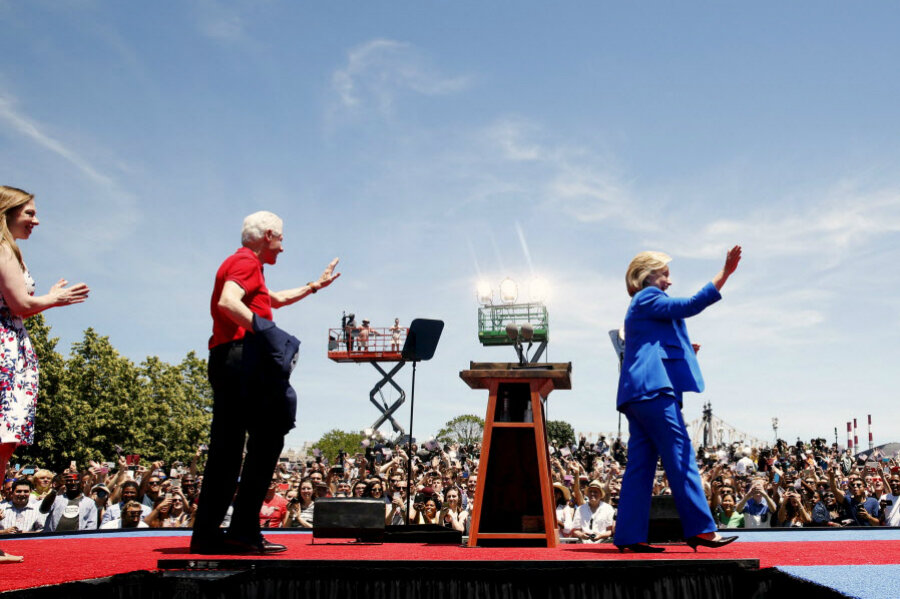Hillary Clinton already giving State of the Union speeches, sort of
Loading...
“You campaign in poetry; you govern in prose,” former New York Gov. Mario Cuomo (D) famously proclaimed. Hillary Clinton is likely to prove Cuomo wrong; her campaign rollout speech over the weekend on New York’s Roosevelt Island suggests she is determined to campaign in prose as well. Indeed, it was about as prosaic a speech as one could image; with its litany of policy proposals and homage to constituency groups it felt more like a State of the Union address than a stirring call to campaign arms. Not surprisingly, reporters in the major newspapers struggled to fashion a lead to their stories that adequately captured a single overarching theme in the speech. Some emphasized its “populist” message, particularly her focus on reducing economic inequities. Others focused on her four “fights," alluding to both her own political career as well as FDR’s “four freedoms” but focusing particularly on Clinton’s homage to the lessons she had learned from her mother, who overcame a difficult upbringing.
What almost everyone agreed on was that the speech was big on broad themes – promoting inclusiveness and economic equality – and more concrete policy objectives – universal preschool, expanded family leave – but weak on the specifics regarding how to achieve those goals. And she largely stayed clear of the more controversial issues – the 12-nation Pacific trade pact, her tenure heading the State Department, or even how to deal with ISIS – that potentially divide the Democratic Party. The sprawling presentation was clearly designed to appeal to a litany of groups – women, labor unions, racial and ethnic minorities, the LGBT community, truckers, veterans, nurses, small business owners – and to tout a broad range of progressive policies presented as common-sense centrist ideas. In short, there was something for everyone, but little to provoke opposition.
Of course, this should not surprise anyone. Clinton is dominating the polls, and the money race as well, and it makes absolutely no sense for her to wade into areas of controversy, or to weigh herself down by embracing policy specifics that are sure to attract fire from opponents. Candidates may campaign in poetry (or, in Clinton’s case in prose), but they also do so in generalities. Details come later, after the election is over.
For me, three aspects of the speech stood out. The first was her self-deprecating reference to her age (if elected, Clinton would be the oldest person other than Ronald Reagan to take the oath of office) and her hair color – allusions that she then turned to her advantage by reminding her audience that she is running a historic campaign: “I may not be the youngest candidate in this race, but I will be the youngest woman president in the history of the United States.”
But she followed this with a rather awkward reference to a Beatles’ song, Yesterday, in a somewhat forced attempt to accuse the Republicans of peddling old ideas: “There may be some new voices in the presidential Republican choir. But they’re all singing the same old song. It’s a song called ‘Yesterday. They believe in yesterday.” Well, perhaps, but it was hard not to listen to that reference and wonder if it more appropriately describes her political career.
A second awkward moment occurred as she sought to flesh out her biography by discussing her mother Dorothy Rodham’s difficult upbringing; Rodham was abandoned by her parents and struggled to establish her own life. But in transitioning to describing how she learned from her mother’s experiences, Clinton’s recitation of her own efforts after graduating from Yale Law School to help the underprivileged seemed to fall flat. It’s not hard to imagine more than one listener contrasting Rodham’s difficult life with Hillary’s financially comfortable existence.
In the end, the speech (you can read it in full here) was unlikely to move voters much. Those who support Hillary undoubtedly found much to like – it was a reminder that she has extensive political experience, embraces mainstream Democratic policies, and as a woman represents a bloc of voters who feel their representation in the White House is long overdue. On the other hand, those who view her as an opportunist who lacks strong convictions, who plays by her own rules, and whose ties to the financial elite blinds her to the need of the middle class aren’t likely to have been swayed to think any differently.
Can she win? She certainly has an audience. Yesterday’s speech was very well attended, but it did not elicit roars of approval so much as polite cheers and applause at the appropriate moments. That response is a reminder that candidates running for a third successive presidential term for their party face a difficult challenge. They must simultaneously carve out their own political identity while not fully repudiating their predecessor’s record. Richard Nixon, Hubert Humphrey, Gerald Ford, George H. W. Bush, Al Gore, and John McCain all struggled with finding the appropriate balance of paying homage to the incumbent and his record but also achieving separation – and of these, only the elder Bush was successful in securing his party’s third presidential term. For Clinton, the issue is further complicated by the dynastic element of her candidacy – a issue that was on full display Saturday, as these pictures by Middlebury’s Elsa Alvarado from the rally demonstrate. They remind us that when Hillary takes the political stage, her husband is invariably somewhere behind her – for better and for worse:
Matthew Dickinson publishes his Presidential Power blog at http://sites.middlebury.edu/presidentialpower/.







